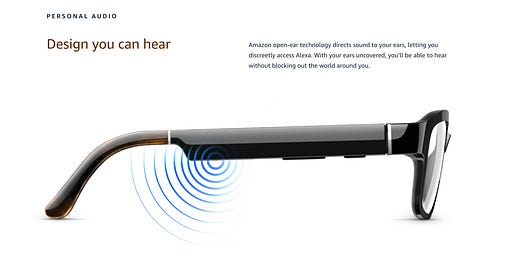Amazon is laying the groundwork for teleportation
A not-so-crazy theory on where they might be headed with their new devices.
Within the next decade, we will be able to teleport. And Amazon is in the best position to build this.
Okay, not literally teleport. That’s only possible at the quantum level right now. However, we will figuratively beam ourselves into the living room of our friends, family, and colleagues to spend time with them. It will change the way society is organized and the way we engage with those closest to us.
Let me explain:
When Amazon Alexa launched in 2014, it did something that I simply did not believe was possible. An always-on, always-listening device that individuals would willingly put in their home.
To date, they have sold over 100 million devices. And more importantly, they have normalized the idea of having a device that is listening to every word you say in some centralized place in your home.
That’s a huge feat, and we will come back to this in a little bit.
Amazon is one of the best “Trojan horse” companies. By “Trojan horse” I mean that they are very good at the misdirection required to get to their larger goal. Alexa is a “smart speaker” but in reality, it’s a data-gathering vacuum for everything that happens in your home or apartment.
In addition to that, they understand the value of convenience better than almost any other large company. We will sacrifice privacy for convenience over the long-run. It’s not something we feel comfortable admitting. But unfortunately, the best companies, through much user research and user behavior analysis, have figured this insight out.
In economic terms, convenience is a highly inelastic “good.” We will pay up for this good. And even if it means we are paying with our privacy, we will do so. That’s why I have an Alexa. I do not want to walk to the light switch or hate the friction of pulling out my phone when I want to set the timer for my Saturday evening Risotto. Convenience wins.
So back to teleportation.
This vision centers around three products—first, the Amazon Alexa, of course. Second, the Echo frames, the Amazon Alexa-enabled eyeglasses.

And I did not see the masterpiece they were working on until I saw this announcement from them this past week.

The Amazon Ring security drone. I mean, look at how cool that thing looks. The idea is that it will patrol around your home to detect intruders, and perhaps you can even check on what glass object your pets decided to knock off the dresser.
This is the “Trojan horse” move I am most impressed by so far from Amazon. They will now be able to layer on visual data on top of the plethora of auditory data they already have. The sheer amount of data Amazon will be able to gather by flying around homes is incredible. Assuming a decent level of adoption and Amazon will have a pretty robust dataset on the objects in our homes (furniture, goods, space etc.) and full layout, floorplan, and the arrangement of key items.
And you could really only make such a bold move from the standpoint of security. If you make it convenient for people to feel secure, well, then you have an incredibly sticky product. That’s precisely why Ring, the video doorbell, was so successful as a product.
By launching the Amazon Ring drone, Amazon has all the pieces out there to make “teleportation” possible.
With a smart speaker, floating camera, and smart glasses, you can quickly imagine a world in which you put on your smart glasses, and your friends, family, loved ones are perfectly rendered sitting next to you on the couch.
Imagine having your friends “over” for dinner on a random weekday evening. Even in a post-COVID world, one can see how valuable such a product could be. Helping individuals feel and be together even if thousands of miles separate them (as I am from most of my friends and family) would be a groundbreaking moment for the augmented reality (AR) movement and humanity.
I, for one, am super excited to see if Amazon can pull this off.


